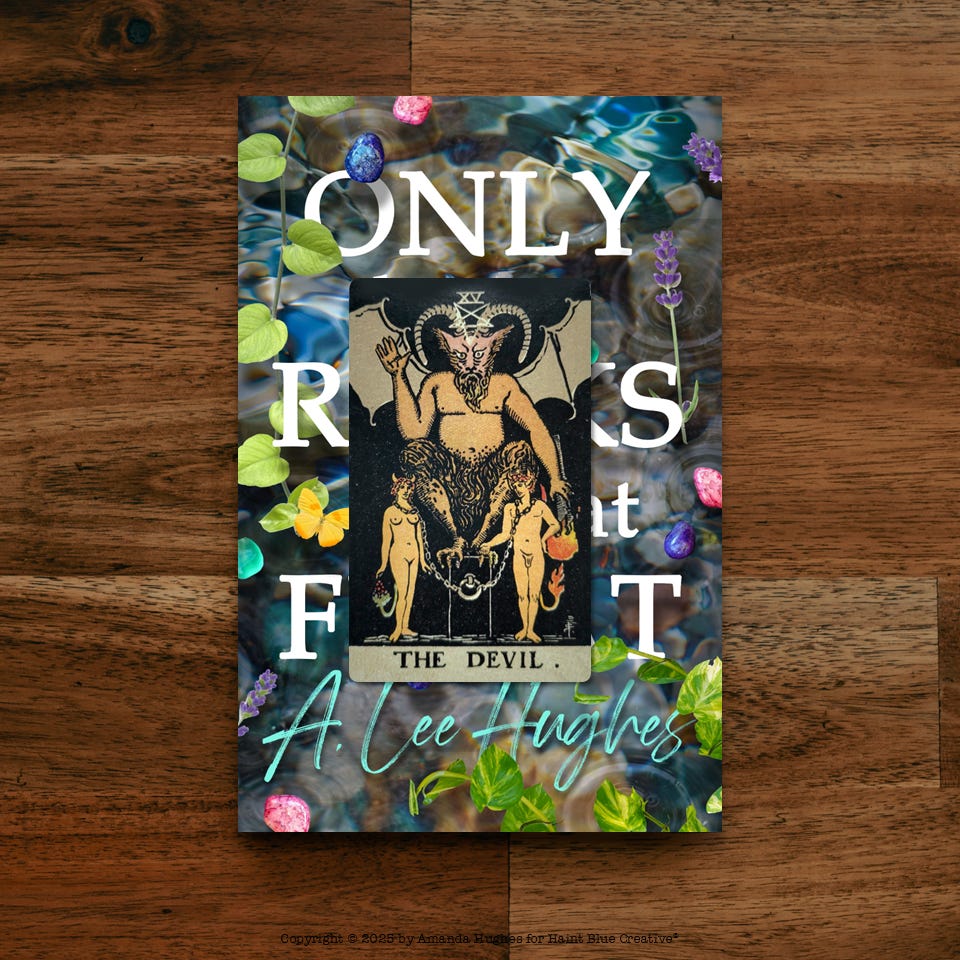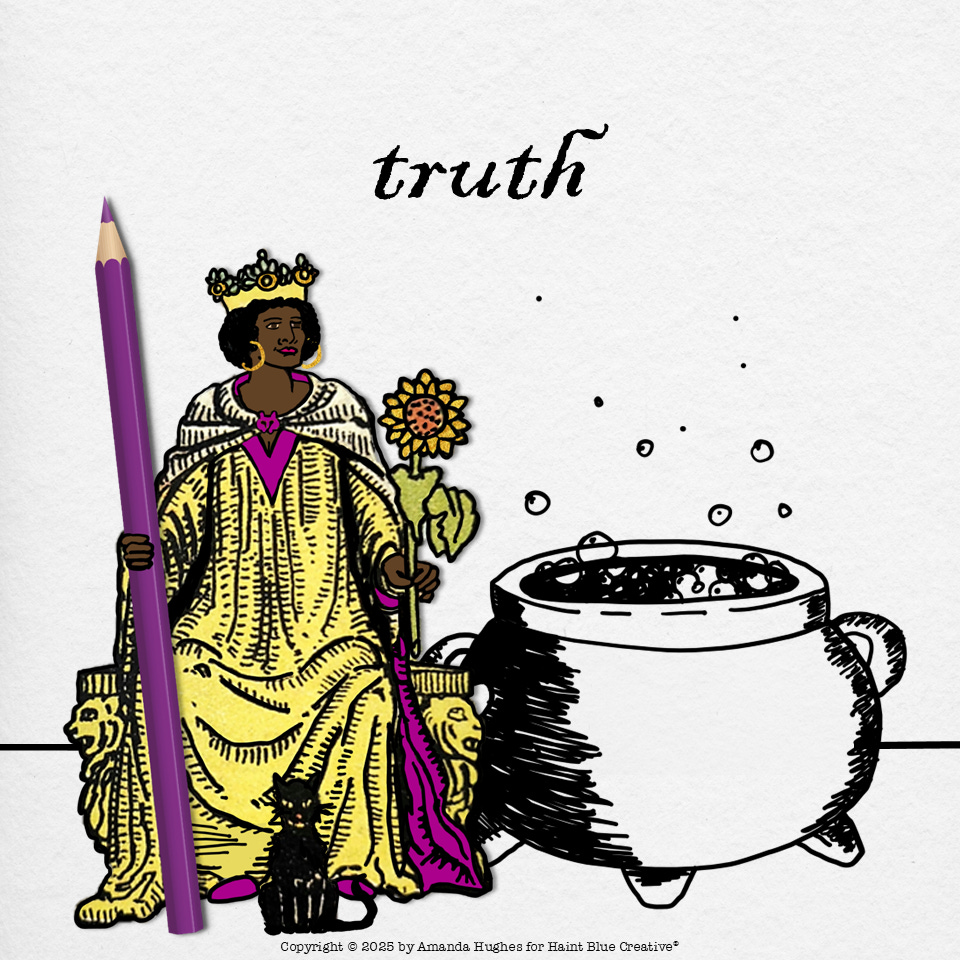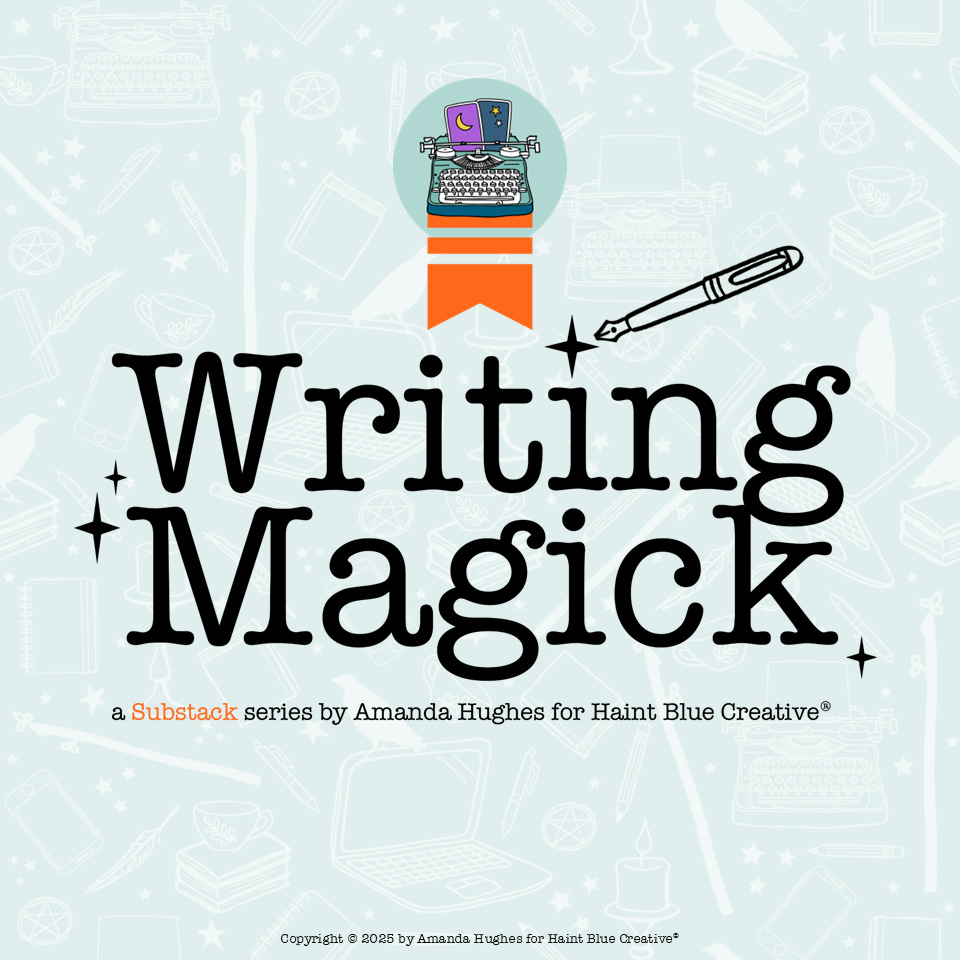In this post:
Tell your truth, even when it’s ugly
When I stopped being ashamed of who I am, my writing evolved.
What can you do? How can you write fearlessly and authentically?
Write What You Know?
Honoring the Truths of Others
Now, Go Forth and Cast Your Spell
When the theme for this post first came to me—telling the truth is a spell—I Googled the phrase to be sure someone else hadn’t already written something similar, and to credit where I first heard the notion, but I found nothing. Filing through my memory, I keep going back to the Magick & Alchemy podcast where I believe one of the hosts, either Kate or Kristin, posed the idea. To whomever credit applies, the phrase lingered in my mind long after I heard it. There’s truth in the words telling the truth is a spell—literally and figuratively—and today I’d like to share how telling the truth by writing fearlessly and authentically can shift your writing practice and your life.
Tell your truth, even when it’s ugly
In my experience, I’ve found the best writers are rebels. In spite of rejection, being added to Banned Books lists, and industry trends, some of the greatest stories I’ve ever read were penned by folks who honored the truth, writing intentionally and without bending to the pressures of conformity. From Toni Morrison to Stephen King, such storytellers write stories they want to read. And they don’t give up, not even when society consistently rejects them.
As another example, I read a lot of magical realism, Southern Gothic, and historical fiction, the authors of which write with blatant honesty the esoteric, ugly, and painful aspects of the human experience society often likes to avoid or hide. When authors liberate their words from societal constraints, stirring in truth, changing minds, and then changing the world, that’s writing magick.
When I stopped being ashamed of who I am, my writing evolved.
One of my truths is that I was born and live in the Deep South, way down yonder on the Bible Belt’s buckle. And that fact used to make me fearful that readers and fellow writers wouldn’t take me seriously. The truth is what it is: the American South is synonymous with a shit-ton of shameful (and sometimes shameless) white people who carried out horrific indecencies, both toward their brethren and the land. Because of this history, along with a stock pot of stereotyping and generational trauma, Southern white folk are often perceived as being ignorant and intolerant.
I am white, but I am neither ignorant nor intolerant, yet I used to fear being labeled as such. I intentionally curtailed the truth when writing stories set in the South, only revealing bits and pieces of the nice parts, the sweet stuff. But the truth isn’t always nice or sweet, and I could tell that my writing reflected such. I wanted to write honestly, but I was terrified of backlash from family and one-star reviews.
Screw that.
Potential backlash is a chain around a writer’s neck, and fear of it is its master.
While being aware of the discomfort of others is healthy and kind, quieting one’s voice to suit their opinions and securities is an unkindness to oneself. Writing your truth releases you from keeping up pretenses, which exacerbates anxiety.
Writing the truth can be scary, especially when it snags the fabric of one’s community. You know what’s even scarier? Going with the flow, staying with the crowd where it’s safe, becoming just another sheep in the herd, easily forgotten and not having been brave enough to jump the fence and explore all the creative possibilities.
What can you do? How can you write fearlessly and authentically?
Writing fearlessly demands unwavering honesty and truth. Write the hurt, the pain, the hateful and ugly things. Feel them and write through them. If your story is based off a true story or inspired by true events, write the experiences as they occurred, without violating the privacy of your muse(s), of course, but honor the truth.
The idea for my novel Only the Rocks That Float evolved from stories my maternal grandmother shared about her childhood spent on a farm in rural Alabama during the Great Depression. Her experience was horrendous, but when the idea for a set of twins—one white and one Black—came to me, I could only imagine how different their experience would’ve been on that Deep South farm. As the story evolved, it unearthed some ugly and taboo realities, and my curiosity to explore the themes, rather than avoid them, prevailed. As a result, my inbox received a few scathing, pearl-clutched reviews from Advance Readers, but the majority of Only the Rocks That Float reviewers found the book unforgettable in all the best ways.
Write What You Know?
Tell your truth can also mean “Write what you know.” Sure, that advice can be valuable, especially to novice writers exploring style and shaping their voice, but it’s important to stretch oneself. Try not to get sucked into your comfort zone so deeply that you can’t pry yourself from its cushions. Remember what I said about Resistance (with a capital R): it can be a thief of action. Conversely, Resistance is a motivator. Resist the urge to stifle your truth. Unloosen your beliefs and experiences and prepare to be awed by all the stories you can weave with them.
Honoring the Truths of Others
When writing about the cultures and experiences of other peoples, research to understand and then write from a perspective that honors those experiences. I’m a white, straight, cisgender, privileged woman. How could I possibly know about the lived experiences of queer folx? Of people of color? I can’t know. But what I can do is listen, research, learn, advocate, and use my privilege in allyship, creating characters from other cultures and groups who honor and validate their muses. While I am not them, my characters are.
Furthermore, while telling the truth is a spell, if conducted carelessly it can backfire. When writing characters inspired by groups outside of your own, consider hiring a sensitivity reader who can help you avoid stereotyping and tactlessness, while writing from a most authentic place, using your most sincere voice. Stay mindful of reader sensitivity, representation, and inclusion, but always lead with the truth.
Now, Go Forth and Cast Your Spell
Every time you start writing, always—always—try to set aside your fears. Although not everyone will love and connect with your work, your fans will find you. There’s enough room on the shelves, in the inches, and on the screen for every voice, every story. Writing fearlessly means writing without regard for what anyone else might have to say—and if it helps you feel better and braver, you can even write under a pseudonym.
Remember, the first person other than you who will read your work will be your editor, so let them help you with matters like sensitivity and tone. Never let your worries and concern for critics stall you from writing; even the most beloved authors and books have one-star reviews, and some of the greatest stories ever shared were and still are on someone’s Banned Books list. Please have courage. Try it right now, right here. Muster your courage and answer this question with your most authentic truth: what do you have to lose?
When was the last time you wrote without fear?
What did you have to say? Do share in a comment. Your experience just might inspire a fellow writer.
In case you missed it...
You can find previously published posts in this Writing Magick series here:
Crafting Your Writing Magick Ritual
Battling Resistance to Fortify Will: Moving from Motion to Action
About Mandy
Amanda "Mandy" Hughes is an author and instructional designer who uses the tarot to inspire storytelling. Her book Mystic Storyteller: A Writer’s Guide to Using the Tarot for Creative Inspiration and companion tarot deck are helping her peers do exactly that. She also writes fiction under pen name A. Lee Hughes. Mandy lives in Georgia with her husband and four sons, two of whom are furrier than the others (but not by much). Visit her website at www.haintbluecreative.com and find her on Substack @HaintBlueCreative.












I am also from the deep south and I'm also white and I also write. It can be a tricky balance. When I was working on my degree (and much older than my classmates) I wrote a very honest essay about growing up and in it I mentioned that I used to wear a jacket with a Confederate flag on it. It was given to me by my cousin. And by the end of the essay I talked about how now he is incredibly liberal and so am I, that we aren't the same people we used to be. And my professor thought it was the very well done. But some of my straight out of high school classmates did not. I suppose because the moral of the story was not explicitly stated, I never said, I now regret what I did, they felt that I was condoning the behavior. It was interesting to see that gap and what I intended and in what they inferred.
Great piece, Mandy, and oh-so-true about the stereotypical South. Keep creating those spells.❤️